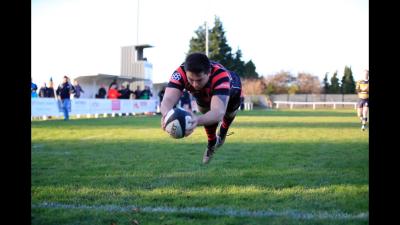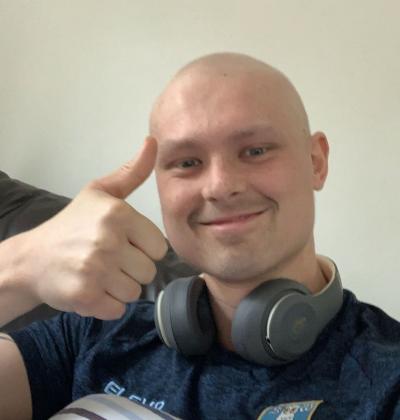I approached cancer treatment a bit like a training plan
Harvey, 23
Harvey’s professional rugby career was cut short when he was diagnosed with a type of cancer called small round cell desmoplastic sarcoma. Here he talks about how positive thinking helped him get through his treatment and imagine a future away from the rugby pitch.
Before I had cancer, I was a professional rugby player. That was my focus all through school and I turned professional at 16.
It was hard to pinpoint symptoms – I just felt really fatigued and generally unwell. I was putting everything down to overtraining or not eating right. Throughout my life it’s been: ‘if you’re unfit, you train harder’, whereas for the first time, the harder I trained, the worse it got.
Then I found a lump in my groin which I had an operation on to remove, and that’s how the cancer was found. At first, they believed they’d got it all in the operation. But once I was referred for a more in-depth scan, I got the full diagnosis – the cancer was in my lungs, bones and soft tissue, and I found out I’d have to start chemo.
When I was told, it didn’t really faze me – I was ready to tackle it. I remember saying: ‘right, when do we start?’
I’ve treated this whole process a bit like a training plan. I’ve made sure my diet’s on point, I’ve made sure I’m still exercising.
I was put in touch with Teenage Cancer Trust. I’ve never really asked questions, but for my mum, being able to talk to somebody with no time pressure has definitely helped her.
I had several rounds of both chemo and radiotherapy, and I’ve spent time on teenage and adult wards, and it’s really highlighted how good it is on the Teenage Cancer Trust unit. On the adult ward, there’s a set time to wake up, everything starts early. In the teenage unit, the nurses are far more willing to work around you.
The nurses are fantastic, you build a personal relationship with them. It makes things less daunting talking to someone you know rather than a complete stranger.
The hardest thing about the whole treatment for me was probably being told there’s no chance I’m going to be fertile afterwards. I’ve always wanted kids so that was quite scary.
When I had my first operation, they gave me a partial vasectomy. Because they wanted to start treatment as quick as possible, I only got one opportunity to freeze sperm.
It’s hard, especially when you’re young, because you don’t think you’re going to face these things for a long time.
I thought the support would all be based around getting you through treatment, but it’s far greater. I’ve spoken to my Youth Support Coordinator Ella about what I want to do in the future. I’ve decided I don’t want to go back into rugby as a career, and she’s helped me loads.
I’d like to go into motivational speaking and do more charity work. Without a doubt, my positive outlook has helped. I know how easy it would’ve been for me to stay in bed on multiple days rather than get up and do things.
I also had a very humbling moment when I needed a blood transfusion. I remember thinking ‘I have no idea who donated this, but they’ve saved my life’. I put a story about it on Instagram and I had four or five friends message me saying they’d booked to give blood.
When you start being open and positive with yourself, you’ll actually find that things start to fall into place a lot easier. Because there really is a silver lining in absolutely everything.



